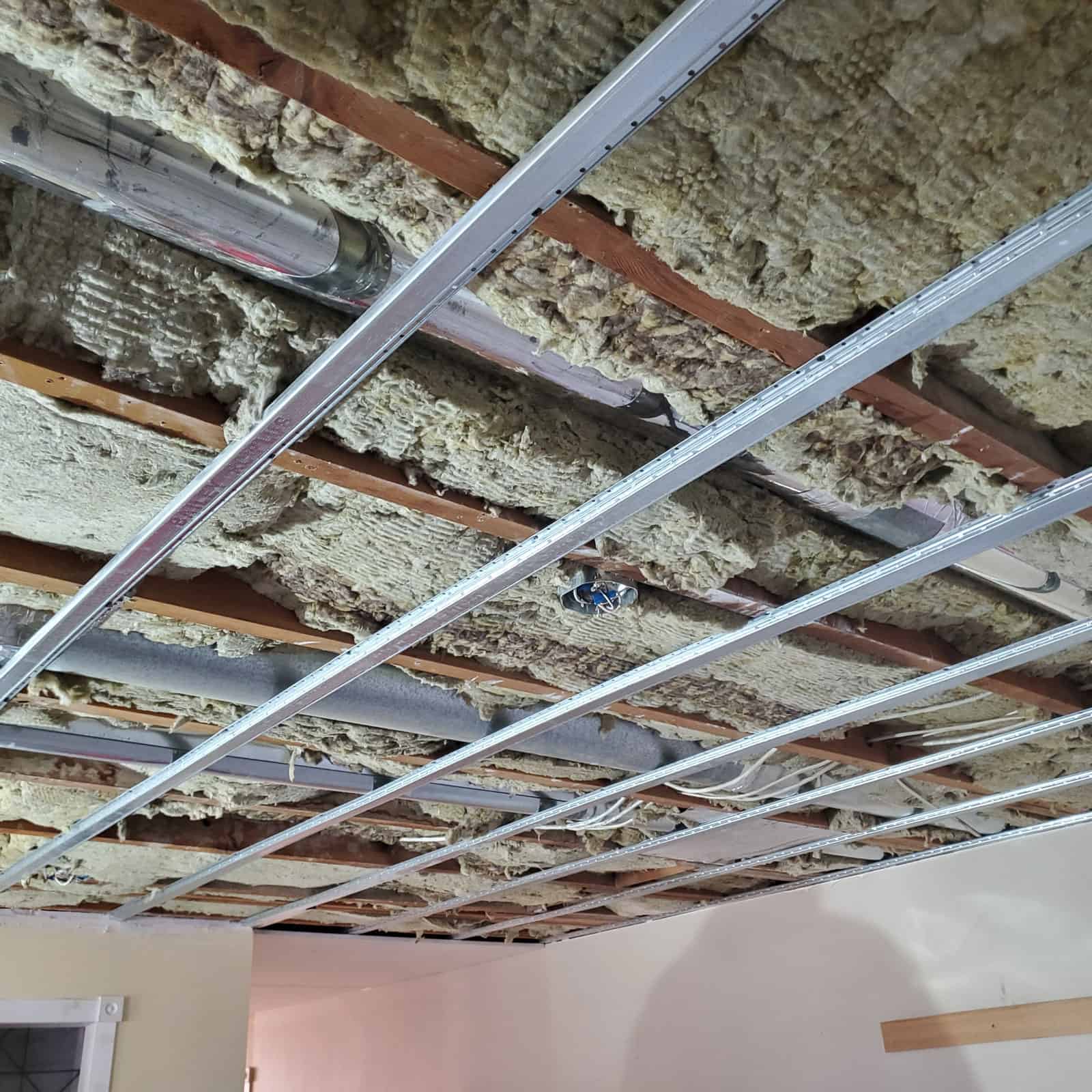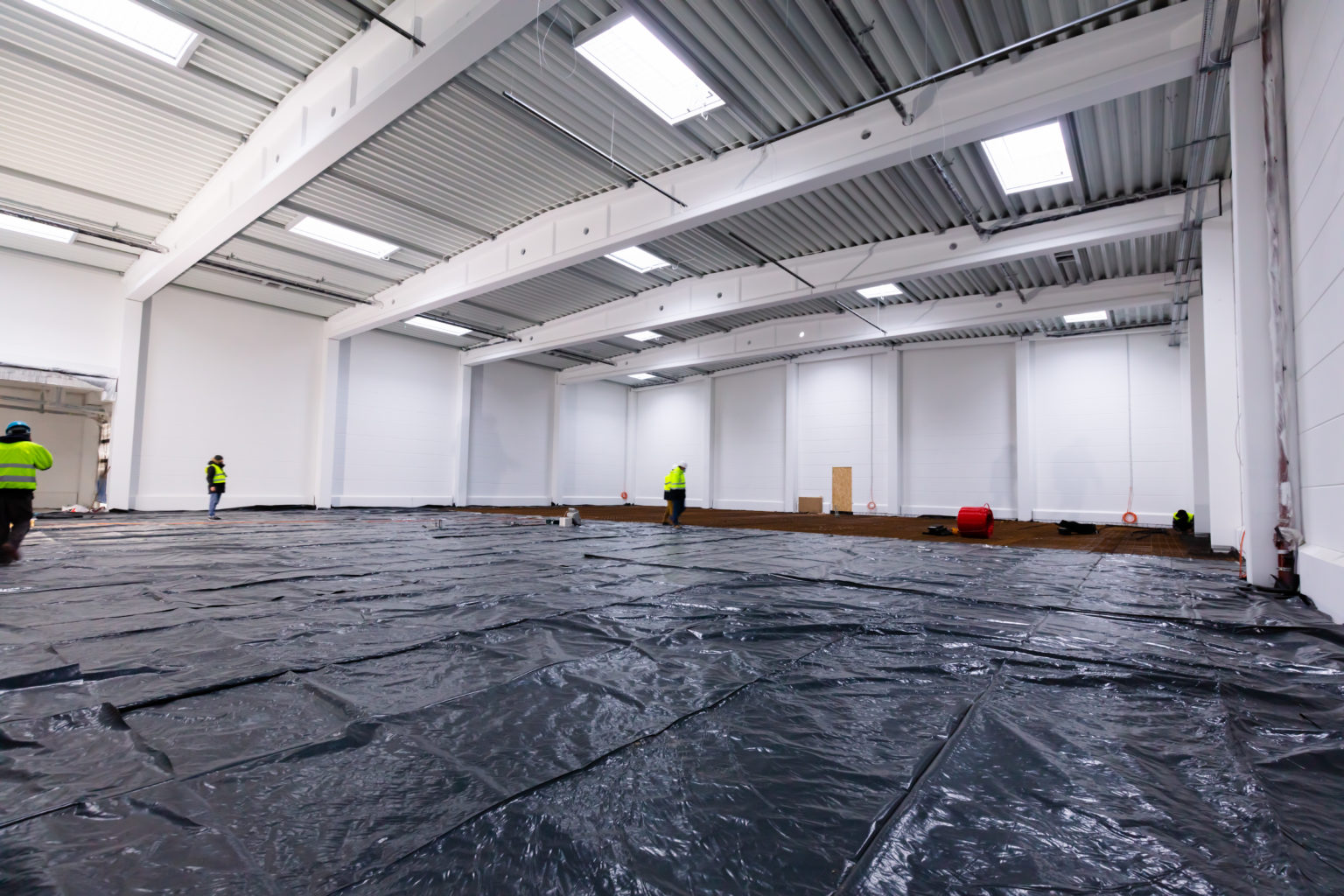Plastic Sheeting Behind Ceiling Drywall For Vapor Barrier - To create a reliable vapor barrier for your home insulation, you should use polyethylene plastic sheeting, ideally 6 mil thick or more. Polyethylene plastic sheeting is a popular choice, but make sure it’s thick enough (usually 6 mils or thicker) for durability. Not all plastic sheeting materials can be considered a vapor barrier for walls and ceilings. Builders using plastic sheeting must meet. Simply put, a ceiling vapor barrier is a material installed on the warm side of your ceiling assembly (usually between the drywall.
Polyethylene plastic sheeting is a popular choice, but make sure it’s thick enough (usually 6 mils or thicker) for durability. Builders using plastic sheeting must meet. To create a reliable vapor barrier for your home insulation, you should use polyethylene plastic sheeting, ideally 6 mil thick or more. Simply put, a ceiling vapor barrier is a material installed on the warm side of your ceiling assembly (usually between the drywall. Not all plastic sheeting materials can be considered a vapor barrier for walls and ceilings.
Polyethylene plastic sheeting is a popular choice, but make sure it’s thick enough (usually 6 mils or thicker) for durability. Not all plastic sheeting materials can be considered a vapor barrier for walls and ceilings. Builders using plastic sheeting must meet. Simply put, a ceiling vapor barrier is a material installed on the warm side of your ceiling assembly (usually between the drywall. To create a reliable vapor barrier for your home insulation, you should use polyethylene plastic sheeting, ideally 6 mil thick or more.
Vapour Barrier Installation Services Richmond Hill ON Pro Insulation
Not all plastic sheeting materials can be considered a vapor barrier for walls and ceilings. To create a reliable vapor barrier for your home insulation, you should use polyethylene plastic sheeting, ideally 6 mil thick or more. Simply put, a ceiling vapor barrier is a material installed on the warm side of your ceiling assembly (usually between the drywall. Polyethylene.
How To Install Poly Vapor Barrier
Builders using plastic sheeting must meet. To create a reliable vapor barrier for your home insulation, you should use polyethylene plastic sheeting, ideally 6 mil thick or more. Polyethylene plastic sheeting is a popular choice, but make sure it’s thick enough (usually 6 mils or thicker) for durability. Not all plastic sheeting materials can be considered a vapor barrier for.
Insulation & Vapor Barrier Installation Gordon Drywall & Painting
Polyethylene plastic sheeting is a popular choice, but make sure it’s thick enough (usually 6 mils or thicker) for durability. Simply put, a ceiling vapor barrier is a material installed on the warm side of your ceiling assembly (usually between the drywall. To create a reliable vapor barrier for your home insulation, you should use polyethylene plastic sheeting, ideally 6.
Vapor Barriers Americover Specialty Plastic Sheeting Solutions
Not all plastic sheeting materials can be considered a vapor barrier for walls and ceilings. Polyethylene plastic sheeting is a popular choice, but make sure it’s thick enough (usually 6 mils or thicker) for durability. Builders using plastic sheeting must meet. To create a reliable vapor barrier for your home insulation, you should use polyethylene plastic sheeting, ideally 6 mil.
Successful Vapor Control Fine Homebuilding
Not all plastic sheeting materials can be considered a vapor barrier for walls and ceilings. Polyethylene plastic sheeting is a popular choice, but make sure it’s thick enough (usually 6 mils or thicker) for durability. Simply put, a ceiling vapor barrier is a material installed on the warm side of your ceiling assembly (usually between the drywall. To create a.
Post Frame Home Ceiling Vapor Barrier Explained! YouTube
Builders using plastic sheeting must meet. Polyethylene plastic sheeting is a popular choice, but make sure it’s thick enough (usually 6 mils or thicker) for durability. To create a reliable vapor barrier for your home insulation, you should use polyethylene plastic sheeting, ideally 6 mil thick or more. Simply put, a ceiling vapor barrier is a material installed on the.
How To Repair Vapor Barrier Behind Drywall?
Polyethylene plastic sheeting is a popular choice, but make sure it’s thick enough (usually 6 mils or thicker) for durability. To create a reliable vapor barrier for your home insulation, you should use polyethylene plastic sheeting, ideally 6 mil thick or more. Not all plastic sheeting materials can be considered a vapor barrier for walls and ceilings. Builders using plastic.
What is correct vapour barrier method for bathroom ceiling in a
To create a reliable vapor barrier for your home insulation, you should use polyethylene plastic sheeting, ideally 6 mil thick or more. Simply put, a ceiling vapor barrier is a material installed on the warm side of your ceiling assembly (usually between the drywall. Builders using plastic sheeting must meet. Polyethylene plastic sheeting is a popular choice, but make sure.
Vapor barrier above ceiling drywall? r/Insulation
Simply put, a ceiling vapor barrier is a material installed on the warm side of your ceiling assembly (usually between the drywall. Not all plastic sheeting materials can be considered a vapor barrier for walls and ceilings. To create a reliable vapor barrier for your home insulation, you should use polyethylene plastic sheeting, ideally 6 mil thick or more. Builders.
Basement Plastic Vapor Barrier Openbasement
Not all plastic sheeting materials can be considered a vapor barrier for walls and ceilings. To create a reliable vapor barrier for your home insulation, you should use polyethylene plastic sheeting, ideally 6 mil thick or more. Builders using plastic sheeting must meet. Polyethylene plastic sheeting is a popular choice, but make sure it’s thick enough (usually 6 mils or.
Not All Plastic Sheeting Materials Can Be Considered A Vapor Barrier For Walls And Ceilings.
Builders using plastic sheeting must meet. Polyethylene plastic sheeting is a popular choice, but make sure it’s thick enough (usually 6 mils or thicker) for durability. Simply put, a ceiling vapor barrier is a material installed on the warm side of your ceiling assembly (usually between the drywall. To create a reliable vapor barrier for your home insulation, you should use polyethylene plastic sheeting, ideally 6 mil thick or more.









